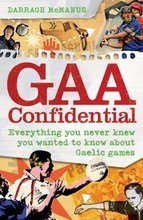Hurling, of course, has a heritage richer than the lovechild of Steven Spielberg and that cat who owns Wal-Mart. Most of the ancient mythological heroes are said to have played iománíocht, like Cuchulainn and Fionn MacCumhaill, while Diarmuid actually won the heart of fair Gráinne by scoring three times in a match, which makes her the first GAA trophy wife, I suppose.
The Brehon laws – the legal code of Ireland until the fifteenth century when those imperialist tramps arsed it all up for us – codified hurling and provided for compensation in case of accident. Amusingly, specific rules were set down on such issues as how, exactly, players should retrieve the ball from a field (seek permission to enter the land, close the gate when leaving and avoid the shotgun-waving irate farmer), and the proper metal from which one’s hurley hoop should be made (bronze for a king’s son, copper for the plebs).
Under the Brehon laws a hurley couldn’t even be confiscated, but then the Normans had to swan in with their killjoy edicts. Literally – it was, ‘Have any joy and we’ll kill you.’ A 1367 Statute of Kilkenny banned hurling on the grounds that settlers should instead be preparing for war by practising their archery. They’d obviously never seen the typical Junior C corner-back in full blood-crazed mode.
In the middle of the last millennium, some landlords had ‘stables’ of hurlers (who, appropriately, were forced to sleep in straw and subsist on horse poo), and huge wagers were laid on intercounty and interprovincial matches by dipsomaniac heirs determined to squander the family estate before its liquid consumption murdered their liver. One 1769 encounter carried the not inconsiderable prize of 300 guineas, though the poor old hurlers, after belting a ball and each other from parish to parish for several hours, generally had to make do with a few barrels of ale. And to think how the top players moan nowadays about making sacrifices.
This noble pursuit even got a mention in Brian Merriman’s epic poem Cuirt an Mhean Oiche, but the Great Famine (1845-‘47) killed much of the interest in hurling. Along with much of the population of Ireland. Thus, the game declined among the common folk, until its revival in the late nineteenth century: first through the establishment of the Trinity College Hurley Union, and then Michael Cusack’s foundation of the Metropolitan Hurling Club in Dublin. But he also helped set up something else, didn’t he? Indeed he did…
Monday, January 19, 2009
Hurling through time
Subscribe to:
Post Comments (Atom)

No comments:
Post a Comment